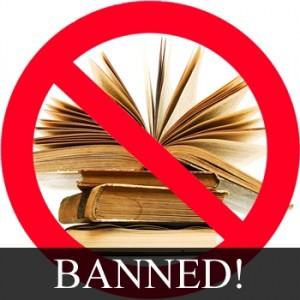By Lily Milholm, Staff Writer
For the past thirty-two years, schools, libraries, and bookstores have banned books that they feel are unsuitable. Since 1983, over 11,300 books have been banned or challenged. Parents, teachers, administrators, or religious groups find these many literary works offensive because they explore a number of “taboo” subjects: sex, profanity, violence, race, religion, and politics.When a person feels uncomfortable that a certain literary work is available to the public, he or she writes to the library or school in which they found the book, requesting its removal. This book is now challenged.

Classics like The Adventures of Huckleberry Finn, The Great Gatsby, and The Lord of the Flies are banned from libraries and book stores all over the world. And why? Because they discuss “inappropriate” material. The Adventures of Huckleberry Finn contains racially explicit descriptions and is considered “trash and suitable only for slums.” How dare Twain point out the hypocrisy of the white man dehumanizing the black man! The Great Gatsby was banned at a South Carolina Baptist College for sex references and “vulgar” language. Sex can not be discussed in the audience of those who have not experienced it, as it might inspire curiosity, and we mustn’t have any of that. The Lord of the Flies was banned from libraries nationwide for the animalistic traits displayed by the boys because heaven forbid we godly humans are reminded that we are, in fact, animals.
In all seriousness, books like these matter. It’s not important that they display intense scenes and it doesn’t matter that they are unsuitable for children under a certain age. Stylistically, authors use the many aspects of literature (diction, symbolism, imagery, characterization, etc.) to convey issues that they feel are important. Issues that they feel need to be discussed publicly. Graphic scenes can be very useful. Often times, they advocate truth that might otherwise not be addressed. The Adventures of Huckleberry Finn created a new era of literature. Mark Twain wrote with a certain honesty that is not mirrored in many other novels of the time. The racial remarks used are intentional. They remind us of a time when black slaves were dehumanized by the white world. They humble us and stress the importance of equality. Yes, The Lord of the Flies is an intense read, but it discusses substantial matter that is important to explore. Often times, we forget that somewhere, buried deep under advanced technology and social norms, we are primal beings. The Great Gatsby tells of a time post-World War I and pre-stock market crash. People blindly enjoyed themselves, and indulged in premarital sex and day-drinking. It was a time of naivety, but proved to be a socially revolutionary time, as so many standards changed.
By sheltering the people from the vulgar language, bloody scenes, sex, religious or political viewpoints in these works of literature, these parents, teachers, administrators, or religious groups shelter them from real issues in the real world. Writers discuss issues they feel are important. Readers absorb their work and are able to gain knowledge and form opinions and beliefs. They see the beautiful sentences so delicately and deliberately put together, or they envision the intense scenes, and are able to perceive a concept in a way that they otherwise wouldn’t have. Literature is purposeful art. No one has the right to limit the people’s exposure.
